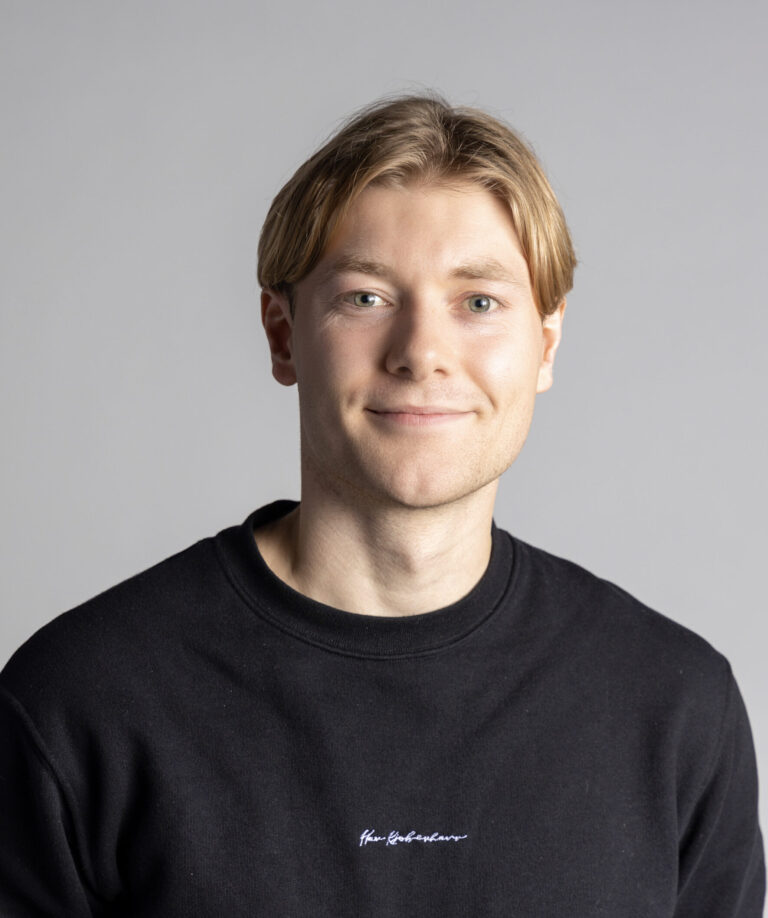As the world prepares for an Olympic year, one Icelander, Sveinn Sampsted, has been working hard to make the world of sports safer and more inclusive for queer people.
Sports fans from all over the world will turn their eyes towards Paris this summer for the 33rd Olympic Games. A lot has changed about the world in the many years since the first modern olympics; one notable change is that societies are slowly starting to realise that there is a need for queer people to feel like they are welcomed and belong in the world of sports.
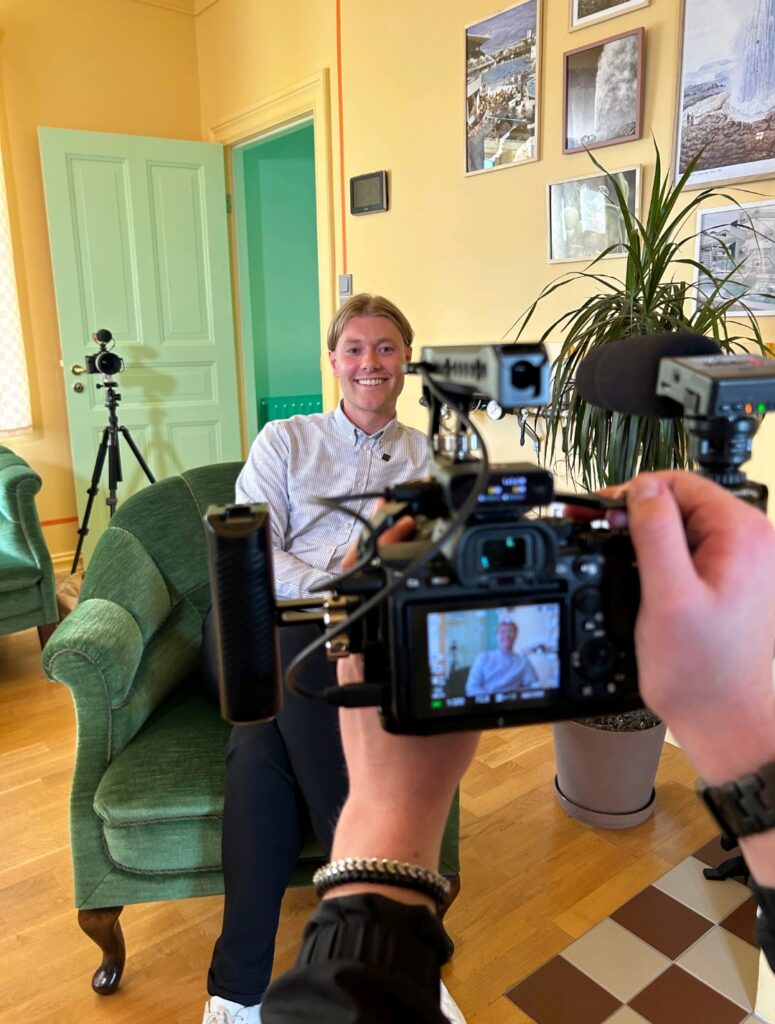
Ensuring a safe and inclusive environment for LGBTQIA+ individuals in the realm of sports is imperative for fostering a sense of belonging and promoting overall well-being. Studies have consistently shown that discrimination or exclusion based on things like sexual orientation or gender identity can have profound negative effects on mental health. According to a 2020 survey by The Trevor Project, queer youth who participated in sports reported lower rates of depression or suicidal thoughts compared to those who didnt.
Inclusive sports environments not only contribute to the physical health of individuals but also serve as powerful means to combat stigma and prejudice, promoting societies where everyone can thrive irrespective of their sexual or gender identity.
Iceland is no different to other countries when it comes to the struggles it faces for queer people in sport and one Icelander, Sveinn Samsted is working for Samtökin ’78, the national LGBTQIA+ organisation of Iceland, to try to make the world of sports in Iceland safer and more welcoming for queer people. Sveinn took some time out of his very busy schedule to chat with GayIceland about how he got involved, what he’s been doing and why it’s so important that queer people feel safe in sports.
GayIceland: “Thanks for chatting with us Sveinn. Can you start by telling us about what you do in relation to queer people in sport?”
Sveinn: “It’s difficult to put it into one simple answer because there are many elements to what I’m doing but to simplify it; I have been working with the queer organisation of Iceland, Samtökin ‘78, to provide education to groups and individuals in the world of sports to try to improve the experiences of queer people. You could say it’s part education, part practical solutions.”
GayIceland: “How did you get involved with this kind of work?”
Sveinn: “My background is in Sports Science from Reykjavík University and I’m currently doing a Master’s Degree at the University of Iceland in Sociology. In 2018, I started doing my research in sport science. I conducted interviews where the main questions were: what is your experience as a queer person in sport and what do we need to improve?
One of the big things I’ve been working on with S78 is to use my own experiences and knowledge and put together a presentation that helps to educate people about the issues that queer people face in sport.
Usually people focused a lot on soccer and the lack of gay men or the abundance of lesbians in the sport but I did also interview people from many sectors of the sports world. Table tennis, crossfit, gymnastics; I just went across the board.
After my research, I was part of the team that created Trans börn og Íþróttir in 2020 (A guide for sports clubs to help them become more inclusive to trans children); But things really took off in 2021 when Australian professional soccer player Josh Cavallo came out as gay and I was asked to come and talk about it on the news. I reluctantly said yes, because I knew I would be outing myself in the process. I mean I was openly gay but I was quite shy at the time.
Members of Samtökin ‘78 saw the interview I did and basically called me saying, “hey, would you like to work with us?” That’s basically how it all started.”
GayIceland: “And have you been doing a lot together since then?”
Sveinn: “Yes and it progressed quite quickly. Now I’ve done lots of other things.
One of the big things I’ve been working on with S78 is to use my own experiences and knowledge and put together a presentation that helps to educate people about the issues that queer people face in sport. I’ve been doing that since September 2022. What makes this presentation a bit different is that it’s not just queer studies; it has the Hinsegin 101 foundation but with an added sport perspective. I’ve been talking to coaches, athletes and volunteers all around Iceland.
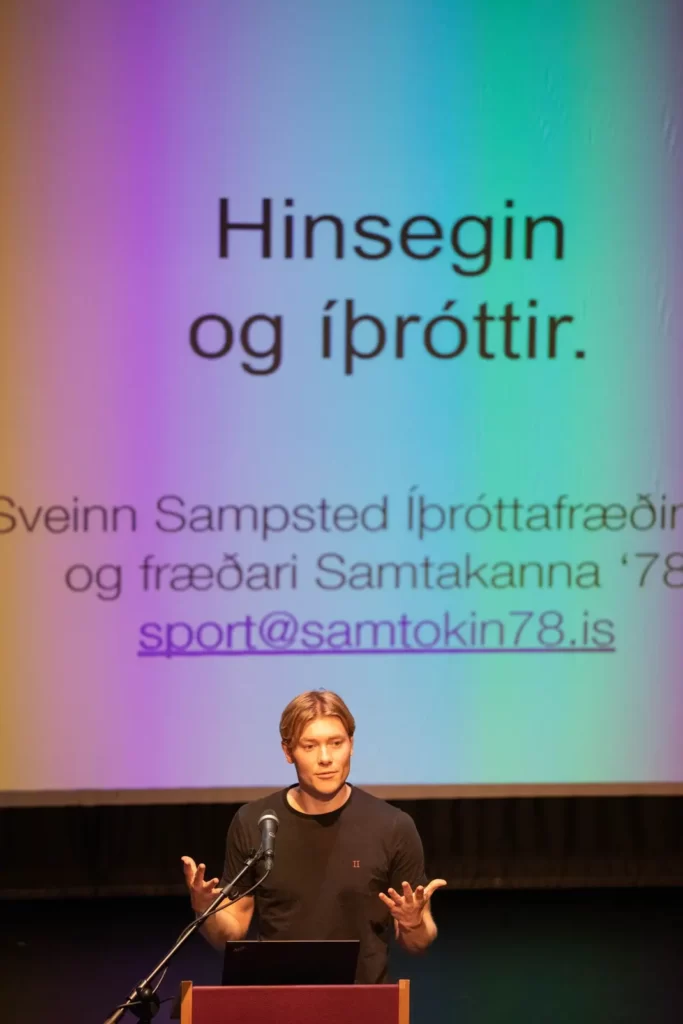
I think I’ve now presented to around 1,500 different people which in the world of sports is a lot. In order to get that many people available to watch a presentation there are a lot of logistical things that need to happen. If coaches come they need to cancel practice, they have to rearrange schedules; this kind of thing isn’t a small task in sport so the fact that clubs are willing to go to these lengths to hear someone talk about why it’s important to think about queer people in sport is a good sign. I think during one presentation I did there were around 200 people who attended. This meant that the club I presented at had to cancel or move practice for every single division of the club just so they could come to see me.
So the work I’m doing has become much bigger than I originally expected. Now we’re working on loads of really cool projects.”
GayIceland: “What do you mean when you say your presentation comes from a sports perspective?”
Sveinn: “So when you think about queer education, there’s basically a 101 course that you can give to people. Things like looking at why it’s important to think about things like pronouns, bullying, personal expression and many more subjects. These are all really necessary, but when I present this, I try to add a bit of my personal experiences as well as my experience working as a coach and athlete to humanise the issues a bit more and give them practical examples they can easily understand. I do get very personal about my own experiences
When I realised I was gay I basically felt like I had to make a choice. I could be an openly gay person, or I could be an athlete but I couldn’t ever be both because that’s not how it was even portrayed in the media.
So for example, instead of just saying prejudice is bad and we should think more about how our words and actions affect other people; I tell them about what it was like being when I was young and I heard a gay slur used but noticed that the coach didn’t say anything about it. It might seem obvious to people within the community that this is bad and people should do something about it, but often those who could do something don’t really know what to do. So I use my own experiences and actually give them processes and tools to deal with these kinds of issues.”
GayIceland: “What sort of personal experiences do you share?”
Sveinn: “I talk about my journey from realising I was gay when I was around 12 years old . I had this realisation but the words and phrases people were using all around, such as “faggot”, “no homo” and “there are no gay men in football/sports sent me into the closet. I wasn’t born in the closet! Sport was really important to me but I was led to believe that there were no queer people in sport. I internalised a lot of this because many people don’t realise that simple phrases have so much impact on queer children. The words that people use have the power to send us back to the closet in droves.
I’ve been an active member of the sports community in Iceland since 1997. I’ve always loved sports and the culture around it; it’s a really big part of who I am and I wanted to be really good at it. When I realised I was gay I basically felt like I had to make a choice. I could be an openly gay person, or I could be an athlete but I couldn’t ever be both because that’s not how it was even portrayed in the media.
For example, I remember seeing stories about English football player Justin Fashanu. The thing the media focused on was that he came out of the closet in 1990 and then sadly took his own life eight years later. As a kid it’s hard to not see those two pieces of information and not think that there’s a clear pattern here. The media around me in my youth only really focused on the stereotypes or character traits. I know now that this didn’t have anything to do with me as an individual but when I was 12, it was a different story. I heard all the things people around me casually said and stayed in the closet for another six years.
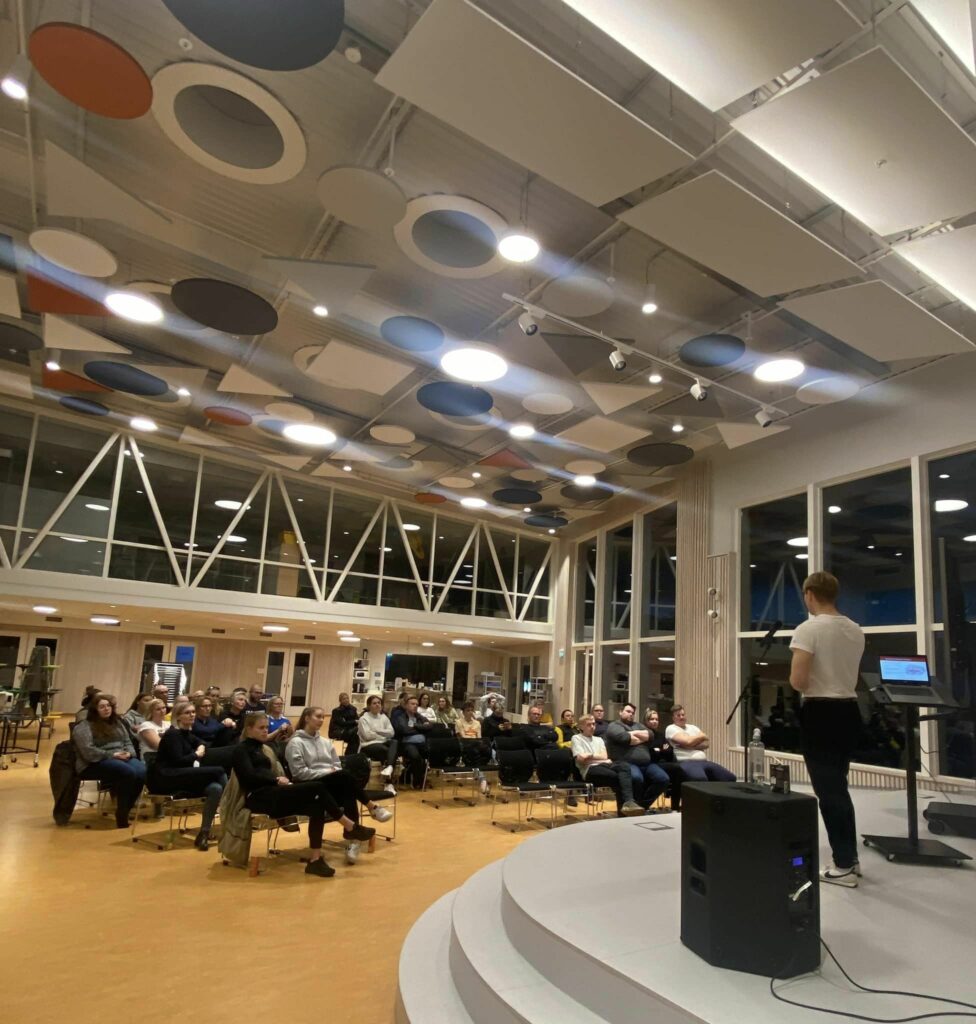
Eventually I came out at 17 and thought I had managed to beat all of the fears that kept me in the closet but when I reached my 20s, I basically had a complete mental breakdown because all of this extra stress I had put on myself over the years manifested in the form of anxiety attacks and internalised homophobia, which took years of therapy to work through.
So even just using my own story as an example, you can see that I’m an otherwise healthy individual but the simple things that were said around me as a child had a massive impact on my mental well-being.”
GayIceland: “And you’re now 29. Do you still feel the scars of some of this now?”
Sveinn: “I have worked through most of it, but the scars show up when I see my own athletes or the kids I’ve worked with going through the same or similar things. I’ve coached hundreds of athletes in my career so far but I still see it. This was the main reason I went into activism.
I remember one specific example. In 2017, I saw an athlete who was about 10 years old. He was playing with a group of girls and having fun, just like I did. Then, a few of young guys ran up to him and said, “why are you playing with the girls, why are you being such a fag?” Nobody did anything about it. I went home and I just cried my eyes out because I was seeing the things I went through as a kid, but as an adult I could finally see how horrible it is.
I saw an athlete who was about 10 years old. He was playing with a group of girls and having fun, just like I did. Then, a few of young guys ran up to him and said, “why are you playing with the girls, why are you being such a fag?”
It was such a hard feeling seeing that even though there was an openly LGBT person coaching, it didn’t have any impact just 50 metres away from me. So that’s why I knew I needed to do something about it to change the system and change the culture.”
GayIceland: “So Samtökin ‘78 asked you to put together a presentation. How was the very first one received?”
Sveinn: “Well the first one did actually go very well, but I think that’s because I was so nervous to do it, I practised in front of the mirror for countless hours. So I knew it word for word, and I even rehearsed every possible question I could think that someone might ask. Maybe it’s because of my history in sports but when I do something I like to do it really well. The stakes were also high for me because I felt like I was doing it for the 12-year-old version of myself. I didn’t have a voice when I was in the closet so it was really important that I use my voice now to help fix that.
I was super scared for the first presentation because it was in Borgarnes and I didn’t know anyone at the club. I was so nervous that I did something I had never done before; I went to a yoga breathing class earlier that day to try to relax… and it didn’t work. I felt nothing but anxiety but as soon as I actually started talking, it all went away. In a way, I knew that there probably wasn’t anyone in that room who knew as much about this topic as me so, in a way I could sort of give myself permission to feel like an expert.
I guess you could say that the issue was much bigger than my anxiety, so when I actually got to speak, it all went away.”
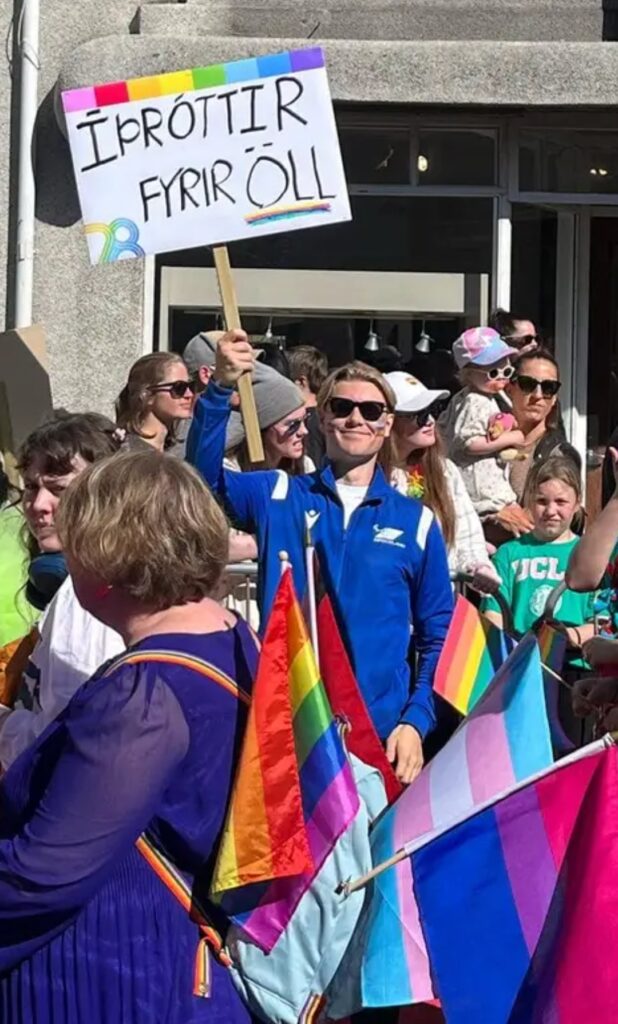
GayIceland: “If a parent, teacher or coach were to ask you, why is it so important for queer kids to feel safe in sport? What would you say?”
Sveinn: “Well, first of all, I would say like, we all deserve to feel safe. Like it’s just a human right to feel safe and be able to participate in a sport you love to take part in, no matter what your level of competition is. But unfortunately this isn’t really the first question people ask. Most people are more likely to ask questions like, “Why is it important we talk about this?”; “Should we be talking about this?” etc.
One reason I like to speak from personal experience is that my own story is something I can’t really be wrong about so it helps me to respond to this. I like to answer these questions by saying that when I was in the closet, I had no idea what the reaction would be if I came out. If people had spoken about it around me in a positive way, it would have given me a hint that it was ok and I was welcomed. So if nobody ever talks about this kind of stuff, it just creates a space for anxiety to keep building because of the uncertainty.
Well, first of all, I would say like, we all deserve to feel safe. Like it’s just a human right to feel safe and be able to participate in a sport you love to take part in, no matter what your level of competition is.
As a kid, if someone speaks positively or negatively about something, you know how they feel about it, but silence can be just as damaging.”
GayIceland: “In the past few months there has been a noted increase in hate speech and public vitriol towards queer people in Iceland. Have you noticed a difference in the audiences when you speak?”
Sveinn: “I have noticed a difference in recent months compared to when I first started. The best way I would describe it is that you can feel a difference in the audience. I rarely know the people I’m going to speak to beforehand so often I have to rely on the atmosphere in the room to know if it’s going well.
When there started to be more hate speech around I could feel that when I came in, it was as though people were just a bit more sceptical of me than when I first started. The atmosphere in the rooms was getting heavier and heavier. I think it reached a peak in about September last year. This was when there were loads of things in the news and online. It was the period when people were, in my experience, the most open with their hateful views I have ever seen in my lifetime.
During this period, when I spoke, sometimes the heavy atmosphere would improve, sometimes it wouldn’t and it was very mentally draining. Sometimes it felt like some people were listening to every word I was saying, trying to figure out if there was some secret message because of what they saw on a website or TikTok.”
GayIceland: “Has it improved since then?”
Sveinn: “Yes it has gotten better, but we’re still fighting a lot of the misinformation around. A lot of it honestly comes from TikTok and social media platforms. I have learned to constantly check what is being said online so I can stay ahead of it. There have even been cases where I saw some misinformation online and in a presentation, someone asks a question that is almost, word-for-word what I saw.
I think it’s important to say though that in my experience, most people fall into the category of the ‘silent majority.’”
When there started to be more hate speech around I could feel that when I came in, it was as though people were just a bit more sceptical of me than when I first started. I think it reached a peak in about September last year.
GayIceland: “What do you mean by that?”
Sveinn: “So often when we talk about issues facing queer people, we focus on the negative minority. The horrible things people are saying on the news or online. In my experience in sport, there’s a very big group of people who are either just completely neutral or supportive, but they don’t state their support. So that’s why they’re silent.
These people are usually family members who have an queer relative, or friend or they just know someone. When I’m travelling, I regularly hear a story like, “Hey, in my volleyball team 10 years ago, there was a gay man, and that’s why we played with rainbow laces.”
So the support is much more, but what I’m teaching people now is how to show the support because they don’t always know how to.”
GayIceland: “If someone reading this article wanted an easy tip for showing support, what would you say?”
Sveinn: “Well, I start by telling people that even though you might be an ally, it’s hard for queer kids to know because it’s not written on your forehead. The easiest thing to do would be to have a visible rainbow symbol somewhere. Most queer people recognise this symbol and it’s a very easy way to let them know you’re an ally without making things awkward or forcing them to talk about something they might be uncomfortable with.
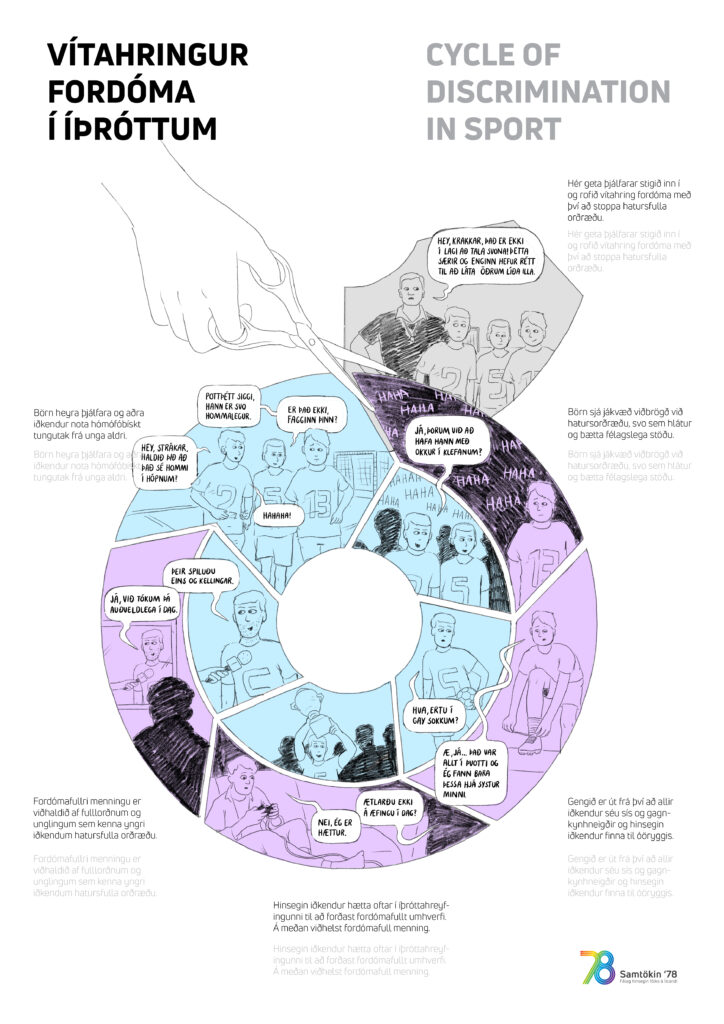
You can also just talk about things naturally, like, “Hey kids, who’s going to Pride this weekend?” Or, “Did you see that athlete came out of the closet? That’s awesome.”
It’s great to just talk about the things in a natural way, not forced. It can also be beneficial to just come right out and say that if there’s an athlete on your team who is queer, you’ll give them your full support. This is actually a tip I stole from the English National Football Team coach Gareth Southgate. He has actually said in the media a couple of times that if an athlete in his team comes out, he will be supportive. So that basically answers every question a queer person might have and shows them that it’s safe to be themselves.”
GayIceland: “You have also been working on educational resources for those who work with children and teenagers in youth and sports programs in conjunction with the Department of Education. Can you tell us a bit more about that?”
Sveinn: “Yes, I have been working on that for more than a year now. I started with a survey looking at the kinds of prejudices people are facing and what needs to be fixed. Based on that we have been making recommendations and coming up with educational material.
The first one which will come out will be about how to stop hate speech and prejudice. I also have instructional manuals for coaches, for referees, for people working in the stands, everyone involved.
“The conference is titled “Is there room for everyone in sports?” So there will be different panels focusing on three topics; people with disabilities, LGBTQIA+ people, and foreign born residents of Iceland. It is part of the Reykjavík International Games.
I made special ethical guidelines for clubs. It’s basically a Code of Conduct. Things like this are good because they help people to see that things won’t be tolerated and it eliminates a lot of the grey areas.
There is also a bit of a problem in sport with “queer dropout”. This is where people stop participating because they don’t feel welcome and it’s a problem for athletes but also clubs because they can potentially miss out on some incredible sports people. Being inclusive is in their best interests. We have been creating an informative story with illustrations to help combat this. To put the issue into an easy to digest way.”
GayIceland: “You’re also speaking at a big conference in Reykjavík on January 25. What’s happening there?”
Sveinn: “The conference is titled “Is there room for everyone in sports?” So there will be different panels focusing on three topics; people with disabilities, LGBTQIA+ people, and foreign born residents of Iceland. It is part of the Reykjavík International Games.
I will be moderating two panels. In one panel I will be talking about how the media talks about queer issues and detailing what I said earlier about how the media portrayal of queer people played a big influence in keeping me in the closet. There are so many examples of real headlines that are damaging, or the way they speak about queer people in sport often doesn’t match the way they speak about cis hetero sportspeople.
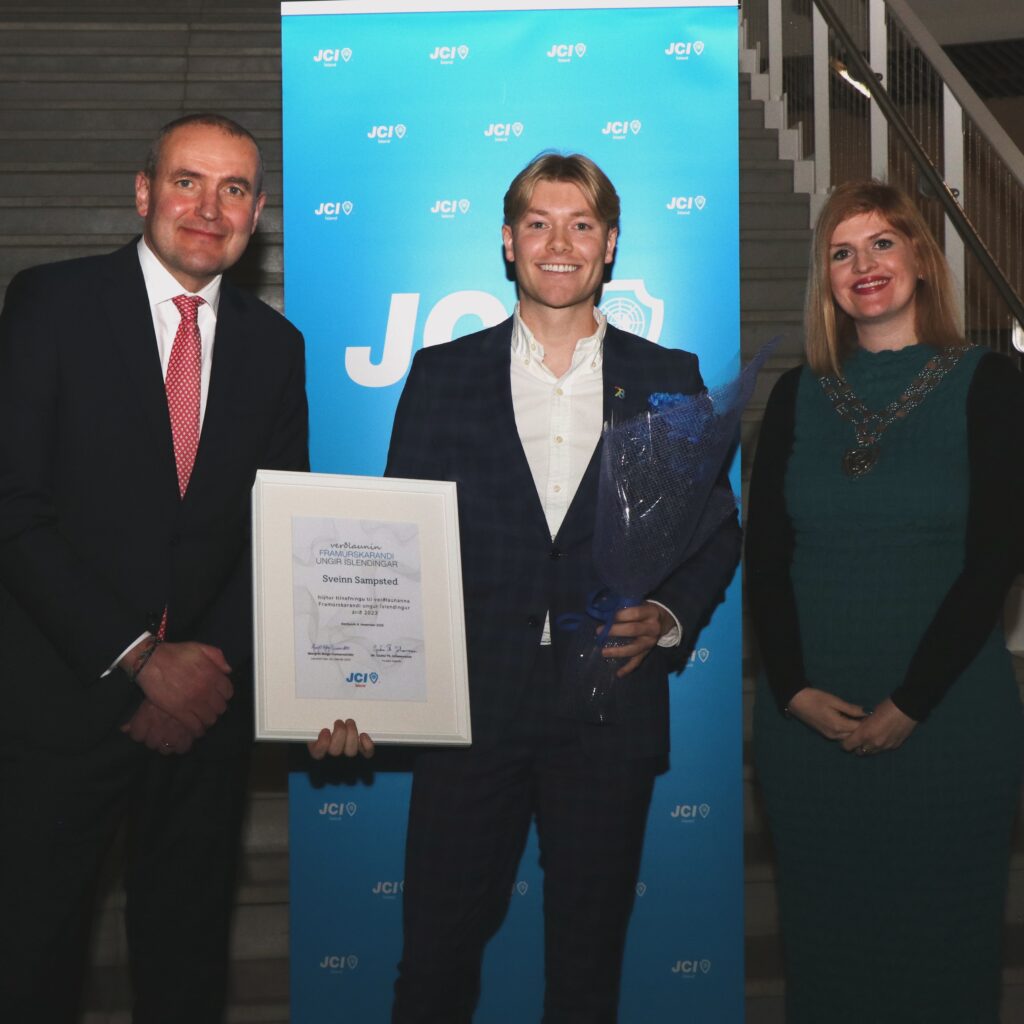
I will also be talking about queer issues in sport for those that live in the countryside. It’s often much different for kids in sport who live in small towns. It’s one thing to be in the city but it’s another when you live in a town of 300 people, and how does prejudice affect the families of these kids.
Another example of my own is that my brother is a professional football player. He’s the right back of the Icelandic national football team. He has played with a rainbow band before to show his support and he still gets asked by people, “Why are you wearing that?” The great thing is that his teammates will often step in and say, “hey, shut up, he’s supporting his brother.” Even allies face abuse sometimes.”
GayIceland: “How can people take part in this conference?”
Sveinn: “You can attend in person or you will be able to watch all 6 panels online.”
During the lectures, the current reigning champions (at that time) of Icelandic soccer came. They all came with their official coaches and physiotherapists. It was the first time this has happened in Iceland.
GayIceland: “Before we let you go, can you share one of your proudest moments in the work you have been doing?”
Sveinn: “So in my presentations, my favourite place to go was my childhood club, Breiðablik. When I went, I was out but not to everyone from the club so I wasn’t sure how it would be taken. They actually took the lecture so seriously that 200 different people came to 10 separate lectures. They booked me ten times so they could get as many people to see the lecture as possible! They had coaches from every single division of the club. During that time I got a lot of handshakes, hugs and congratulations. So many of these people were part of that silent majority I mentioned earlier. They had been in my life since 1997 but had never known how to show their support and now they were doing it effortlessly. I think it was probably the biggest healing moment I’ve been through.
Also when it comes to sport in Iceland, footballers have typically had a bit of a reputation for not being supportive of queer people. During the lectures, the current reigning champions (at that time) of Icelandic soccer came. They all came with their official coaches and physiotherapists. It was the first time this has happened in Iceland and at the end some asked me where they could buy rainbow laces.”
If you would like to attend the conference you can get all the information you need here. If you would like to get in touch with Sveinn to find out more about the work he is doing with S78 you can email sport@samtokin78.is

